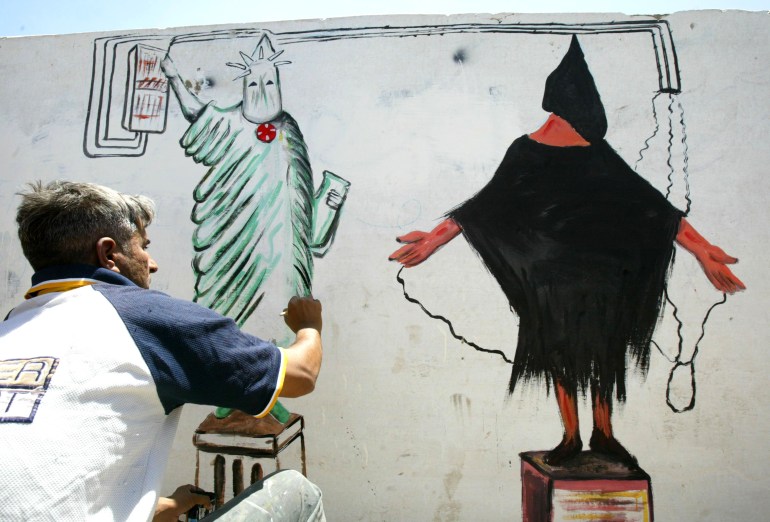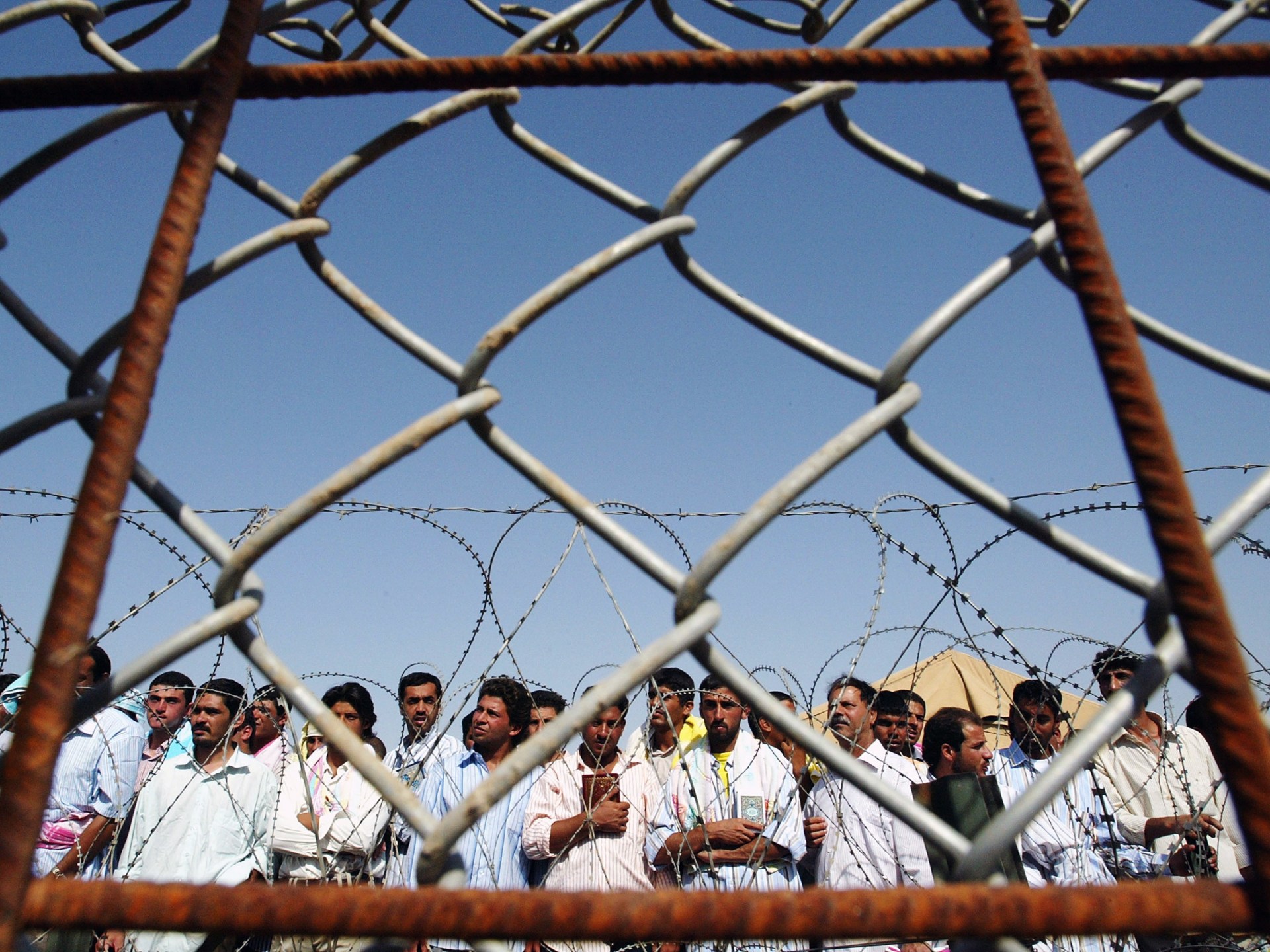When the US TV news programme 60 Minutes II revealed images of Iraqi men being abused and humiliated by their American jailers at Abu Ghraib prison in Iraq 20 years ago this weekend, the United States-led invasion and subsequent occupation of Iraq was just 13 months old.
Toppled Iraqi President Saddam Hussein, who had been captured by US forces more than four months earlier, was awaiting trial on charges of crimes against humanity, and the Iraqi state itself was in the grip of violence and disorder.
For many in the Arab world, Abu Ghraib quickly became a symbol of US imperialism and hypocrisy, shattering then-US President George W Bush’s repeated claims that the US was a bastion of human rights.
Two decades later, a civil case that has been brought by Abu Ghraib victims against a US contractor that operated at the prison is under way. Many are now viewing Israel’s ongoing US-backed military action in the Gaza Strip, where more than 34,000 Palestinians have been killed since October, through the prism of the Abu Ghraib scandal, which first came to light on April 28, 2004, and sent shockwaves around the world.
What did the Abu Ghraib images show?
The photographs broadcast on 60 Minutes showed US guards at Abu Ghraib subjecting Iraqi prisoners to various forms of violence, sexual assault and humiliation. Many of the prisoners had been apprehended by US soldiers on suspicion of being part of armed groups, but according to the International Red Cross, 70 percent to 90 percent of them were innocent bystanders who had been arrested mistakenly.
One image showed naked prisoners heaped into a pyramid with their US captors standing smiling behind them. Another showed a US soldier holding a naked prisoner on a leash.
However, the defining image of the scandal proved to be the haunting depiction of a hooded Iraqi man holding electrical wires and standing on a box.
Then-US General Mark Kimmitt, who was deputy director of coalition operations in Iraq and was interviewed for the April 2004 CBS News story, said: “Frankly, I think all of us are disappointed at the actions of the few. You know, every day we love our soldiers, … but frankly, some days we’re not always proud of our soldiers.”
Subsequent revelations by CBS News disclosed that the US army report on which the US broadcaster had based its original story on Abu Ghraib had in fact detailed “numerous incidents of sadistic, blatant, and wanton criminal abuses” of Iraqis by US soldiers at the prison.

Was there any other evidence of abuse at Abu Ghraib?
Soon after the photographs of US soldiers humiliating and mistreating Iraq men were released on CBS News, the International Committee of the Red Cross published its own report on abuse at the prison.
The report detailed incidents of abuse witnessed by Red Cross observers from March to November 2003 and carried out “during arrest, internment and interrogation”, particularly of “persons arrested in connection with suspected security offences or deemed to have an ‘intelligence’ value”.
The Red Cross said it had uncovered numerous examples of violations of the Geneva Conventions by US military personnel. For example, the report said Red Cross observers had witnessed US soldiers mistreating Abu Ghraib prisoners by keeping them naked in total darkness in empty cells.
In the executive summary for its report, the Red Cross said so-called high value detainees “were at high risk of being subjected to a variety of harsh treatments ranging from insults, threats and humiliations to both physical and psychological coercion, which in some cases was tantamount to torture, in order to force cooperation with their interrogators”.
The abuse was, “in some cases, tantamount to torture”, the Red Cross report said.
Were any US soldiers held accountable?
Private Lynndie England, the soldier pictured holding a leash attached to a naked Iraqi man lying on the ground at Abu Ghraib prison, which had been a notorious place of torture during the presidency of Saddam Hussein himself, appeared in several prisoner abuse images. In 2005, England was found guilty of six counts of abuse by a US military court and sentenced to three years in prison. She was released in March 2007.
Charles Graner Jr, a US army prison guard convicted by a military court of leading the abuse of detainees at Abu Ghraib, was handed a 10-year prison term in 2005 after being convicted of five counts of assault, maltreatment and conspiracy. Graner was freed in August 2011.
Of the 11 soldiers court-martialled by the US military for mistreating Iraqi prisoners at Abu Ghraib, nine were given jail time.
But it soon became apparent that American abuse of Iraqi inmates was not confined to Abu Ghraib. Indeed, after CBS revealed the Abu Ghraib scandal, the news corporation started to learn of the existence of army investigator interviews that also brought to light the abuse of prisoners at other detention centres in Iraq, such as al-Mahmudiya prison, a temporary holding facility, for which other US military personnel were also jailed.
Have Iraqi victims of US torture received any kind of redress?
In September, Human Rights Watch said: “The US government has apparently failed to provide compensation or other redress to Iraqis who suffered torture and other abuse by US forces at Abu Ghraib and other US-run prisons in Iraq two decades ago.”
The existence of the Federal Tort Claims Act, which gives the US government immunity from any lawsuits arising during war, means seeking redress is particularly difficult.
Instead, Iraqi victims of US abuse have been forced to pursue US military contractors, which Chris Bartlett, a US photographer who has been shooting portraits of Abu Ghraib’s torture survivors since 2006, noted to Al Jazeera were “hired … to create a layer of liability distance so the federal government could be shielded from responsibility”.
Most recently, on April 15 this year, a federal court in Virginia began hearing the case of Al Shimari et al v CACI, a private security firm hired in 2003 by the US government to interrogate Iraqi prisoners at Abu Ghraib.
The defendants are being represented by the US-based Center for Constitutional Rights, which in 2013 won a $5m settlement for its Iraqi clients from Titan Corp, another military firm working at Abu Ghraib.
In the Virginia case, the advocacy group is seeking compensation for three Iraqi clients – Suhail Najim Abdullah Al Shimari, Salah Al-Ejaili and As’ad Al-Zuba’e – who allege that “CACI participated in a conspiracy to commit unlawful conduct including torture and war crimes at Abu Ghraib prison,” where they were tortured.
On Monday, the eight-person jury in the case retired to consider its verdict.
Why has Israel’s war on Gaza drawn comparisons with US torture at Abu Ghraib?
Israel’s deadly campaign of air strikes against the Hamas-governed Gaza Strip, which began on October 7, was soon followed by reports of Israeli soldiers beating and humiliating detained Palestinians, which many likened to US torture at Abu Ghraib.
On October 31, the pro-Palestinian advocacy group Jewish Voice for Peace wrote on X: “The footage of Israeli soldiers torturing Palestinian men in the West Bank is horrific. The Israeli military has brutally abused Palestinian prisoners for decades. As the Israeli military wages a genocidal war in Gaza, its soldiers are no longer hiding this abuse from the public.”
It added: “It’s no surprise … that the same government that tortured Iraqis in Abu Ghraib is funding the same tactics on Palestinians.”
Sarah Sanbar, an Iraq researcher at Human Rights Watch, told Al Jazeera that a former Iraqi detainee told her images of stripped Palestinians being rounded up and restrained by Israeli forces in Gaza were “very retraumatising and triggering and took him right back to 2003 and 2004 when he was being tortured [by the Americans] at Abu Ghraib”.
Check out our Latest News and Follow us at Facebook
Original Source

